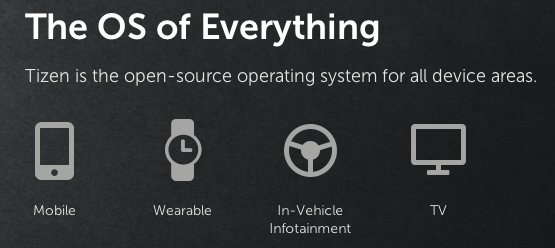At Samsung’s Tizen Developer Conference in San Francisco last week, the world’s largest phone maker introduced two of the first products, a smartphone and a TV, to run on the company’s own Tizen operating system. Samsung is hoping that using the open-source Tizen, instead of Google’s Android system, will differentiate them from other electronics companies. The major challenge for the company is getting developers to create apps for the fledgling operating system.
The new smartphone running on Tizen, the Samsung Z, launches in Russia in the third quarter of this year. The new interface certainly has some similarities to the look of Android-based phones, such as the Samsung Galaxy S5. There are multiple home screens, an app tray, a pull-down notifications tab, and widgets known as “Dynamic Boxes” in Tizen.
Samsung also added some functions that are already in some of their other phones. According to CNET, “Safety assistance, the ultra power-saving mode, and the fingerprint scanner are all present. There’s Private Mode, a simple start screen mode, blocking mode, the download booster that utilizes both Wi-Fi and the data network, and split-screen multitasking.”
The apps will be the real challenge for Samsung. Currently, the Samsung Z smartphone has Samsung staples such as S Health, S Voice, S Translator, and the WatchOn TV remote app, but it is missing most major apps with the exception of Twitter and Google Search.
The Wall Street Journal describes the situation as a chicken-and-egg dilemma. “It needs developers to make great apps in order to entice consumers to buy devices, but developers aren’t inclined to devote energy to the platform until consumers start buying them.”
“The Tizen project resides within the Linux Foundation and is governed by a Technical Steering Group. The Technical Steering Group is the primary decision-making body for the open source project, with a focus on platform development and delivery, along with the formation of working groups to support device verticals,” explains the Tizen About page. The steering group is comprised of Samsung, Intel and others.


No Comments Yet
You can be the first to comment!
Sorry, comments for this entry are closed at this time.